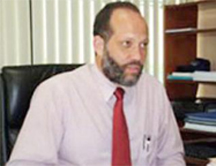The region’s flagship programme, the CARICOM Single Market and Economy (CSME), could not be successful without the “full participation” of youth, particularly since young people under 30 represented 63% of the region’s population, Ambassador Irwin LaRocque, Assistant Secretary-General, Trade and Economic Integration, CARICOM Secretariat said on Thursday.
Speaking in Antigua and Barbuda at a conference to mark the end of a two-year project designed to familiarise students with opportunities which reside in the CSME, Ambassador LaRocque underscored that the youth within CARICOM had a critical role to play in the success of the regional integration movement, according to a press release from the CARICOM Secretariat at Turkeyen.
The forum titled “Conference of Students Engaging the CSME Through Field Promotion,” closed the curtain on a project which saw 283 students travelling to various CARICOM countries to obtain ‘first hand’ experience of opportunities which the CSME presents. Ambassador La Rocque noted that the project was necessary since the CSME was “widely unknown, misunderstood and under-appreciated” among youth, according to research done by the CARICOM Commission on Youth Development (CCYD).

In this context, he said that the CARICOM Secretariat was “committed to undertaking a series of initiatives aimed at empowering and positioning young people to take advantage of and contribute to regional integration and the CSME.”
Career opportunities
However, contrary to perceptions that the CMSE was put on hold, LaRocque said, “CSME is alive and functioning although its implementation has not been at a pace some would have hoped to see.”
He told the participants that the work done over the past two years was pertinent in consolidating gains achieved so far.
“Your views will be key in determining how we proceed with the further development of the Single Market and Economy,” he was quoted as saying.
Against the backdrop of findings by the CCYD contained in the Report “Eye on the Future: Invest in YOUTH NOW for the Community Tomorrow” that most youth preferred to leave the region in search for career opportunities and a better life, the ambassador said that the exercise was vital in identifying what career opportunities existed within the CSME, giving expression to the Declaration of Paramaribo on the Future of Youth in the Caribbean Community.
Meanwhile, a significant outcome of the project will be a publication detailing the experiences of the students during the field study of the CSME.
Based on the discussions at the Conference in Antigua and Barbuda, the publication will include recommendations, which LaRocque said “will add another crucial piece of information and recommendations to what is already obtained in the Report of the CARICOM Commission on Youth.”
The European Union, CSME Focal Points and the CARICOM Secretariat were lauded by LaRocque for the critical roles they played in the success of the CSME project designed to edify the region’s youth.
Meanwhile, Antigua and Barbuda Prime Minister Baldwin Spencer in remarks at the final phase of the project emphasized that critical to successful implementation and effectiveness of the CSME is the education of the various publics and their understanding and buy-in to the relevance, the scope, the benefits and the ownership of the CSME, the release stated.
Winning support
He pointed out that the objectives of this project, Students Engaging the CSME through Field Promotion, and similar projects, continue to be to educate the region about the CSME to win their support for regional integration and to demonstrate how to use the law, institutions and economic conditions to seek employment and to develop business enterprises.
But even with the strides being made at the national and regional levels, the awareness studies and assessments of the public education efforts are still calling for increased activities, noted the prime minister who is also his country’s minister of foreign affairs.
He acknowledged that this is a herculean task which has some limited support through collaborations, since even at the national level there are dwindling resources and competing priorities.
Many community institutions are challenged with insufficient financial and technical resources and the present economic environment compounds the challenges, he observed.
However as the CSME moves to the stage of “how to” it is critical that the next generation understand their reality on cross-border operations and appreciate the facts about new opportunities.
After all, without investment in the youth of the region, there can be no long-term strategy for the CSME, he added.
Over 500,000 Euros was spent to initiate strengthening community relationships and to provide practical training to two hundred and eighty-three students from twelve CARICOM member states participating in the CSME.
The basic strategy was to ensure that students from one country would experience the CSME in a practical manner in another member state. And many of the students who participated in the programme were able to identify potential opportunities for employment, creation of businesses and some have signalled their interest in remaining in the region.
“These, coupled with the ongoing efforts to engage the CARICOM Youth Ambassadors, who are now excellent spokespersons for engaging peers and colleagues in a “youth friendly” manner, should be a great start to creatively engaging our youth in a long-term strategy for the region,” Spencer told the students.







